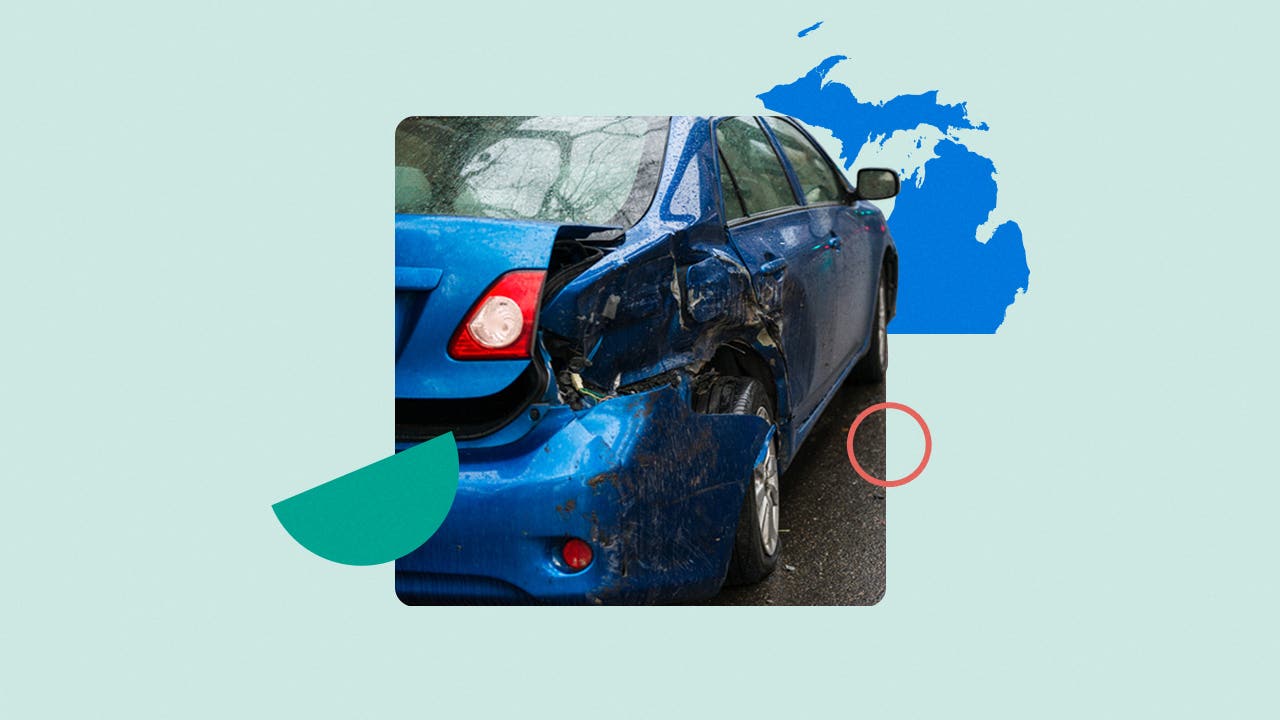Car insurance after a hit-and-run in Michigan

Any time you’re involved in an accident in Michigan, no matter how minor it may seem, you’re responsible for stopping to exchange information with other drivers. If you hit personal property, you should leave your information or seek out the owner to provide your details. Leaving the scene of an incident is considered a hit-and-run in Michigan and comes with potentially serious consequences. Hit-and-run laws in the Great Lakes State include financial penalties and jail time. Bankrate took a careful look at hit-and-run laws in MI to help you understand what to do if you’re involved in one, and the potential impact on your insurance.
Hit-and-runs in Michigan
Under Michigan law, drivers are required to stop at the scene of an accident. However, as of 2022, 19.6 percent of Michigan drivers were uninsured — the fifth-highest rate in the U.S., according to the Insurance Information Institute. And drivers without insurance could be more likely to leave the scene of an accident to avoid getting in trouble for not carrying coverage.
That said, it is probably in your best interest as an insured driver to protect yourself. Purchasing uninsured motorist coverage, which is an optional coverage type in Michigan, may add an extra layer of financial protection in the event you are the victim of a hit-and-run.
Michigan hit-and-run laws
Michigan state law requires you to stop your vehicle if you know or have reason to believe that you’ve been involved in an accident. You should stop your car at the scene of the accident, or as close as possible if you are obstructing traffic. If you feel it’s unsafe to stay at the scene, you should report the accident to the police as soon as possible.
If you are involved in a hit-and-run, whether you are at fault or not, leaving the scene can result in being charged with a misdemeanor — or worse. Potential penalties in Michigan vary depending on the severity of the accident.
- If you leave the scene of an accident where there is property damage: You could face up to 90 days in jail, a fine of up to $100 or both.
- If you leave the scene of an accident resulting in serious injury or death: You may face felony criminal charges with prison time of up to five years, a fine of up to $5,000 or both.
- If you leave the scene of an accident where you caused the death of another party: You may face felony criminal charges punishable by up to 15 years in prison, a fine up to $10,000 or both.
How does a hit-and-run affect car insurance in Michigan?
Any accident where you are at fault is likely to result in an increase to your car insurance premium. Insurers view people with traffic incidents on their record as more likely to file a future claim. If you are responsible for a hit-and-run, and you’re caught, you may be placed in an even higher risk category by your car insurance company. The addition of criminal charges or points on your record are also likely to increase your premiums more than a standard at-fault accident.
It’s hard to say exactly how much a hit-and-run would affect your car insurance premium, because it depends on the other incidents on your record and the seriousness of the accident. However, potential rates can be steep on top of Michigan’s already above-average rates. On average, Michigan drivers pay $3,049 per year for full coverage car insurance — about 25 percent more than the national average of $2,458 per year. After causing an at-fault accident, Michigan drivers pay an average of $4,497. A hit-and-run accident would probably mean paying even more.
What to do after a hit-and-run in Michigan
In addition to stopping, drivers must take certain steps following any accident to stay in compliance with Michigan hit-and-run laws. These include giving personal and vehicle information to the person or occupants involved in the accident, rendering aid to anyone injured and arranging or providing transportation for injured parties.
If you’re the victim of a hit-and-run, experts also recommend that you:
- Get medical help if needed. If anyone is injured, even if the injury seems minor, your first responsibility is to contact 911 quickly so they can be stabilized and moved to a hospital or care center.
- Get to safety. If you can do so without difficulty, move your vehicle off the road to a safe location out of the flow of traffic. Be very careful opening your door or getting out of your car if there is traffic moving around you.
- Call the police. This is a good idea even if there is minimal damage. An official police record can help your insurance company to determine what happened in the accident. The police are likely to question you—anything that you can remember about the other car will be helpful.
- Record the damage. If your vehicle is damaged, and you are in a safe location to do so, take photos with your cell phone of the car’s damage, along with the site of the accident. It’s also a good idea to have a file of all paperwork involved with any medical care you received. This can help your insurance company resolve your claim quickly and efficiently.
- Contact your insurer. If the damage is very minor, you may decide not to file a claim. But in most cases, you will want to contact your insurance company and give them the details you’ve collected. You can often do this with a phone call or via the company’s website. If you talk to an agent, they can answer questions and help you understand what your policy will cover.
Frequently asked questions
Methodology
Bankrate utilizes Quadrant Information Services to analyze November 2024 rates for all ZIP codes and carriers in all 50 states and Washington, D.C. Rates are weighted based on the population density in each geographic region. Quoted rates are based on a single, 40-year-old male and female driver with a clean driving record, good credit and the following full coverage limits:
- $100,000 bodily injury liability per person
- $300,000 bodily injury liability per accident
- $50,000 property damage liability per accident
- $100,000 uninsured motorist bodily injury per person
- $300,000 uninsured motorist bodily injury per accident
- $500 collision deductible
- $500 comprehensive deductible
To determine minimum coverage limits, Bankrate used minimum coverage that meets each state’s requirements. Our base profile drivers own a 2022 Toyota Camry, commute five days a week and drive 12,000 miles annually.
These are sample rates and should only be used for comparative purposes.
Incidents: Rates were calculated by evaluating our base profile with the following incidents applied: clean record (base) and at-fault accident.
Why we ask for feedback Your feedback helps us improve our content and services. It takes less than a minute to complete.
Your responses are anonymous and will only be used for improving our website.
You may also like

8 types of personal loans and their uses — plus 5 to avoid







